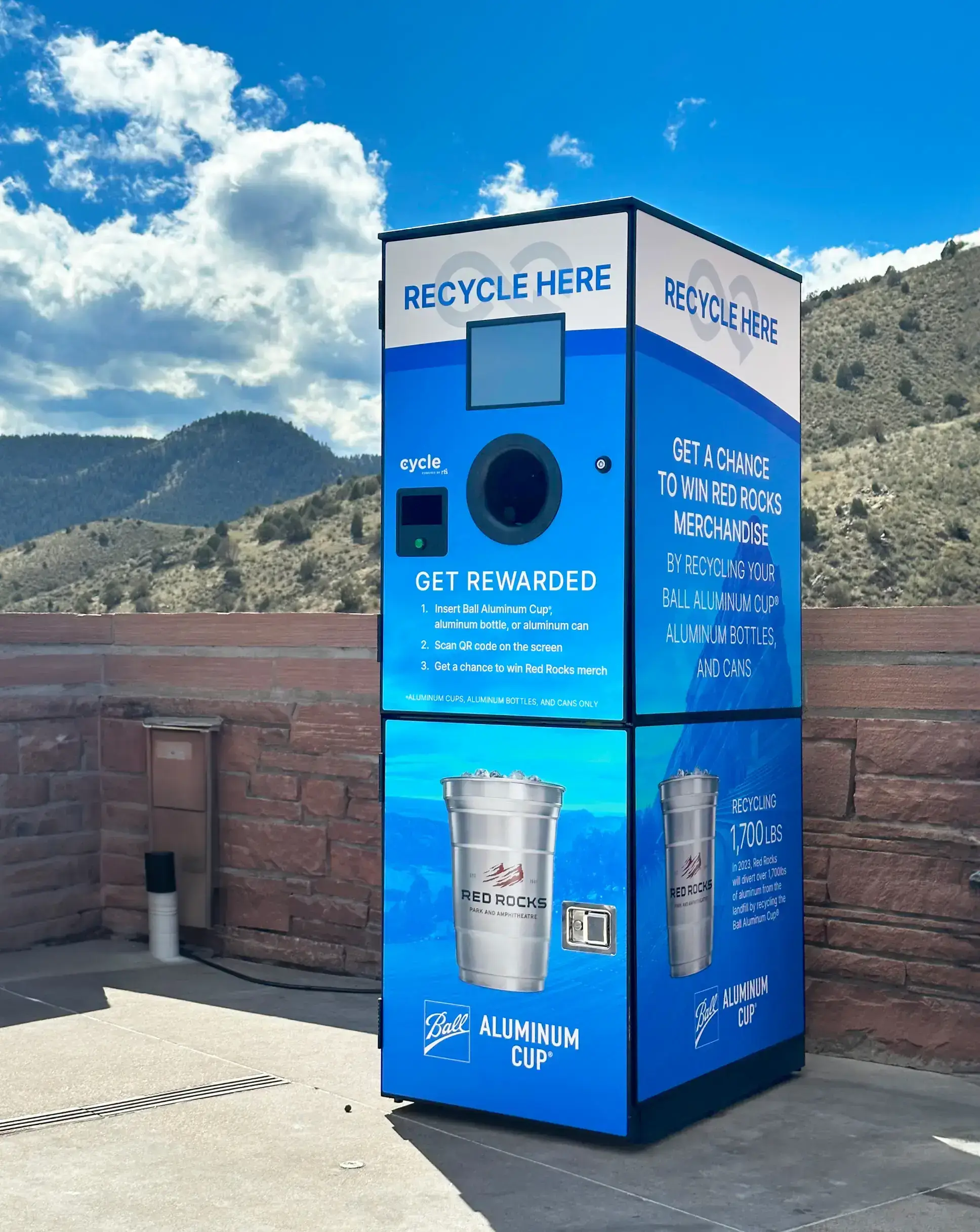波尔铝杯®宣布在红石露天剧场安装循环反向自动售货机 (RVM)
美通社科罗拉多州布鲁姆费尔德 2023年10月25 日电 -波尔铝杯®(纽约证券交易所股票代码:BALL)和丹佛艺术与场地公司(Denver Arts& Venues)今天宣布在红石露天剧场(Red Rocks Amphitheatre)的顶部广场安装一台反向自动售货机(RVM),以增加场馆内的铝回收利用。该机器已于 2023 年10 月2 日安装完毕,并将在红石剧场使用至2023 年 11 月 12 日。Ball Aluminum Cups® 自 2021 年以来一直是红石露天剧场和丹佛艺术与场馆的官方可持续发展合作伙伴,并提供可持续发展的饮料器具,帮助客人每年减少数百万个一次性易拉罐、杯子和瓶子。
全球领先的可持续铝制饮料包装供应商波尔公司与领先的 RVM 供应商合作 循环,由回收轨道系统® (RTS) 提供动力该回收机的安装地点位于红石镇的红石公园(Red Rocks)。该回收机旨在提高红石体育场的回收率,并向消费者宣传使用铝的好处。 游客可以将自己的 Ball Aluminum Cup®、铝罐或铝瓶放入机器前端,然后机器会使用传送带对铝包装进行扫描、粉碎和分类。包装分类完成后,用户将有机会扫描二维码,赢取红石公司的商品。
"波尔铝杯®总经理兼总裁Emily Fong Mitchell表示:"在红石体育场安装反向自动售货机将波尔的许多优先事项变为现实--鼓励回收利用、向消费者宣传铝的可持续特性以及通过娱乐活动推动变革。"与 RVM 互动将使客人积极参与回收,同时通过赢取红岩商品的机会提升他们在现场的整体体验。
RVM 的安装将有助于红石体育场现有的垃圾分类工作。红石体育场每年接待游客超过 100 万人次,通过使用三桶垃圾收集系统和员工垃圾分类小组,努力减少垃圾填埋量,最大限度地提高回收利用率。本赛季结束时,RVM 将能为红石提供铝回收的数量、类型和质量指标。
"红石音乐节发言人布莱恩-基茨(Brian Kitts)说:"反向自动售货机是让红石音乐节粉丝参与可持续发展的一种有趣方式。"我们使用 Ball Aluminum Cup® 的最佳方式是让粉丝们了解杯子的无限可回收性,并成为实现这一目标的合作伙伴。
"Recycle Track Systems® 首席执行官格雷戈里-莱蒂里(Gregory Lettieri)表示:"在 RTS,我们很高兴能够利用 Cycle 的创新解决方案,在标志性的红岩露天剧场与 Ball Aluminum Cup® 合作开展这项活动。我们的合作不仅仅是回收,而是将可持续发展游戏化。Cycle 不仅方便了回收,还吸引并奖励了游客。我们共同展示了技术和可持续发展如何结合在一起,为所有人创造难忘的体验,同时对我们的地球产生积极的影响。
铝具有无限的可回收性和经济价值,是最具可持续性的饮料包装材料,与铝罐一样,铝杯也很容易回收。如今,75% 的铝仍在使用,而铝罐、铝杯和铝瓶可在 60 天内回收并重新摆上商店的货架。波尔铝杯®现在由 90% 的可回收成分组成,是同类饮料包装中可回收成分比例最高的,并有5 种不同的尺寸可供选择。除了可持续发展和可回收利用的优势外,铝杯还具有重量轻、坚固耐用、触感凉爽的特点,并能提供更高的饮用体验。
有关 Ball Aluminum Cups®的更多信息,请访问Ball 网站。如需了解 Cycle 的反向自动售货机,请访问RTS 的网站。
关于波尔公司
波尔公司为饮料、个人护理和家用产品客户提供创新、可持续的铝包装解决方案,并主要为美国政府提供航空航天和其他技术与服务。波尔公司及其子公司在全球拥有 21,000 名员工,2022 年净销售额达 153.5 亿美元。
欲了解更多信息,请访问 www.ball.com或在或或微博.
关于丹佛艺术与场馆
丹佛艺术与场馆是丹佛市和丹佛县负责运营该地区最著名设施的机构,包括红岩露天剧场、丹佛表演艺术中心、科罗拉多会议中心和丹佛体育馆。
关于 Cycle 和 Recycle Track Systems® (RTS)
Cycle 是一个数字回收平台,利用 RVM(反向自动售货机)奖励在大学、体育场和活动中回收饮料容器的消费者。由 RTS 提供支持的 Cycle 在 宾夕法尼亚州费城的林肯金融球场、华盛顿特区的国民公园等地设有机器。Cycle 由人工智能优化废物管理和可持续发展提供商 Recycle Track Systems® (RTS) 提供支持。
Forward-Looking Statements
This release contains “forward-looking” statements concerning future events and financial performance. Words such as “expects,” “anticipates,” “estimates,” “believes,” and similar expressions typically identify forward-looking statements, which are generally any statements other than statements of historical fact. Such statements are based on current expectations or views of the future and are subject to risks and uncertainties, which could cause actual results or events to differ materially from those expressed or implied. You should therefore not place undue reliance upon any forward-looking statements, and they should be read in conjunction with, and qualified in their entirety by, the cautionary statements referenced below. Ball undertakes no obligation to publicly update or revise any forward-looking statements, whether as a result of new information, future events or otherwise. Key factors, risks and uncertainties that could cause actual outcomes and results to be different are summarized in filings with the Securities and Exchange Commission, including Exhibit 99 in Ball’s Form 10-K, which are available on Ball’s website and at www.sec.gov. Additional factors that might affect: a) Ball’s packaging segments include product capacity, supply, and demand constraints and fluctuations and changes in consumption patterns; availability/cost of raw materials, equipment, and logistics; competitive packaging, pricing and substitution; changes in climate and weather and related events such as drought, wildfires, storms, hurricanes, tornadoes and floods; footprint adjustments and other manufacturing changes, including the startup of new facilities and lines; failure to achieve synergies, productivity improvements or cost reductions; unfavorable mandatory deposit or packaging laws; customer and supplier consolidation; power and supply chain interruptions; changes in major customer or supplier contracts or loss of a major customer or supplier; inability to pass through increased costs; war, political instability and sanctions, including relating to the situation in Russia and Ukraine and its impact on Ball’s supply chain and its ability to operate in Europe, the Middle East and Africa regions generally; changes in foreign exchange or tax rates; and tariffs, trade actions, or other governmental actions, including business restrictions and orders affecting goods produced by Ball or in its supply chain, including imported raw materials; b) Ball’s aerospace segment include funding, authorization, availability and returns of government and commercial contracts; and delays, extensions and technical uncertainties affecting segment contracts; failure to obtain, or delays in obtaining, required regulatory approvals or clearances for the proposed transaction; any failure by the parties to satisfy any of the other conditions to the proposed transaction; the possibility that the proposed transaction is ultimately not consummated; potential adverse effects of the announcement or results of the proposed transaction on the ability to develop and maintain relationships with personnel and customers, suppliers and others with whom it does business or otherwise on the business, financial condition, results of operations and financial performance; risks related to diversion of management’s attention from ongoing business operations due to the proposed transaction; the impact of the proposed transaction on the ability to retain and hire key personnel; and c) Ball as a whole include those listed above plus: the extent to which sustainability-related opportunities arise and can be capitalized upon; changes in senior management, succession, and the ability to attract and retain skilled labor; regulatory actions or issues including those related to tax, environmental, social and governance reporting, competition, environmental, health and workplace safety, including U.S. Federal Drug Administration and other actions or public concerns affecting products filled in Ball’s containers, or chemicals or substances used in raw materials or in the manufacturing process; technological developments and innovations; the ability to manage cyber threats; litigation; strikes; disease; pandemic; labor cost changes; inflation; rates of return on assets of Ball’s defined benefit retirement plans; pension changes; uncertainties surrounding geopolitical events and governmental policies, including policies, orders, and actions related to COVID-19; reduced cash flow; interest rates affecting Ball’s debt; successful or unsuccessful joint ventures, acquisitions and divestitures, and their effects on Ball’s operating results and business generally; and potential adverse effects of the announcement or results of the proposed transaction on the market price of Ball Corporation’s common stock.
来源 波尔公司

